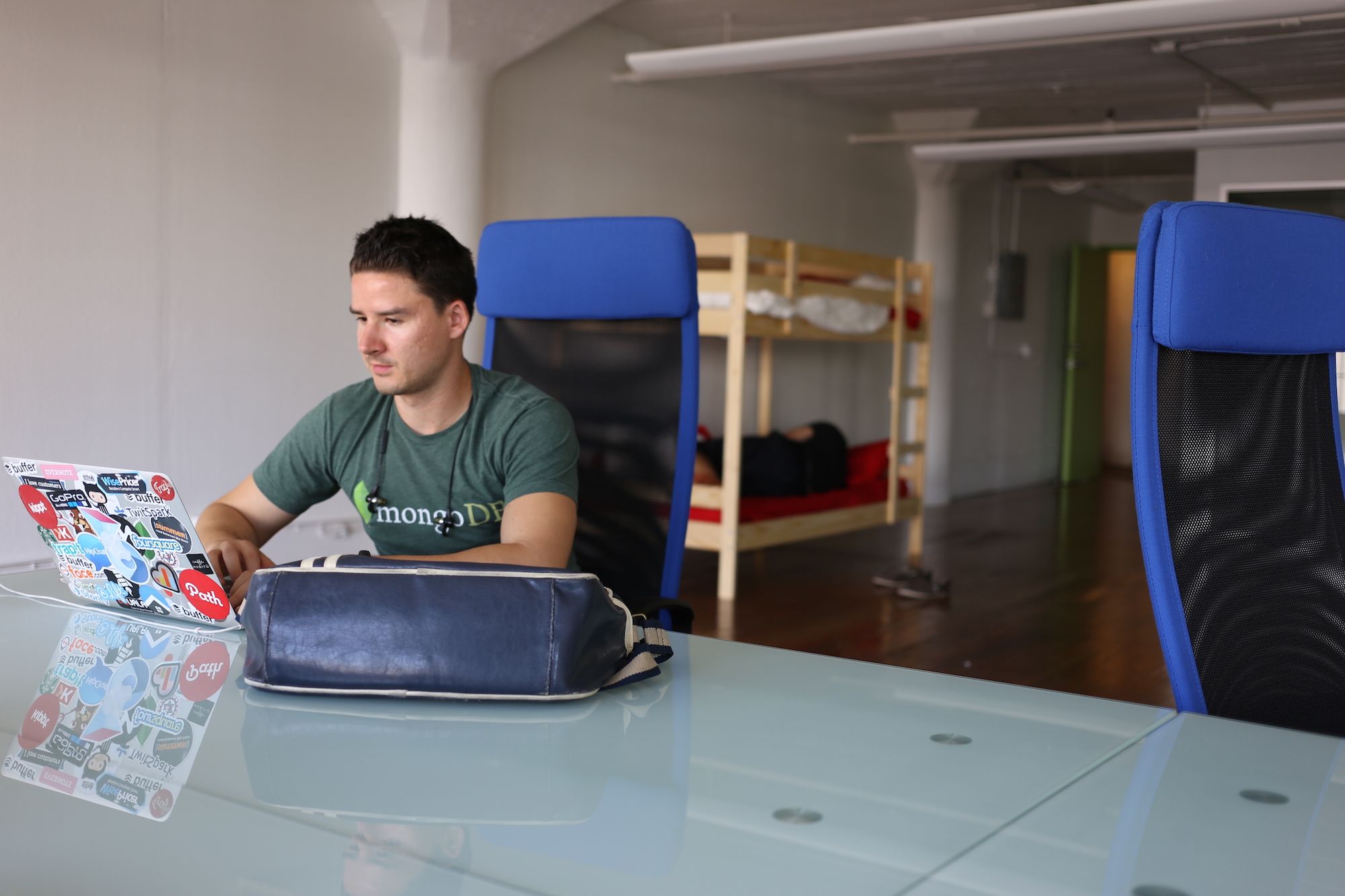
Competition, Culture and Tough Feedback: 13 Questions with Buffer Founder Joel Gascoigne
CEO and co-founder @ Buffer
Not too long ago, our pals at Product Hunt were kind enough to ask Buffer founder Joel Gascoigne to host an “ask me anything” chat session.
10,000+ words and many dozen questions later, we wanted to share some of our favorite questions and answers with you, too.
1. Joel’s average weekday
Q: What’s your average weekday like?
A: These days I generally have a lot of quick meetings with different people in the team. I’m mainly focused within product/engineering, customer service, hiring and then on the higher level.
My calendar is open to people in the team, and it generally gets quite booked up. I have quick 20-minute sessions to give advice on a specific challenge. I also have one-on-ones with several people in the team, and so I usually have one of those each day too.
Other than work, I try to exercise several times a week too (either strength training at the gym, running, or doing a bodyweight workout at an outdoor gym).
2. Developing Buffer’s culture
Q: How did you come up with the idea of culture in the early days of Buffer and help the employees at Buffer understand the culture? – Adhi
A: I didn’t know what culture and values were when I started Buffer. It’s something that I learned about over time.
When we hit around 9 or 10 people at Buffer, I started to experience first-hand the impact of team dynamics. It was only then that I started to learn about company culture and tried to read as much as I could and watch presentations about it. By that point, a few parts of the culture had started to become clear: transparency, a focus on self-improvement, etc. But we hadn’t put this in to words.

It was right around then that I watched an interview that Tony Hsieh from Zappos had. I can’t remember exactly which one it was, but he was asked by the interviewer: if you could go back and start Zappos again, what would you do differently? He said that they had waited until they were more than 100 people before they put values into words and documented their company culture. If he were to start again, he’d do that from Day 1.
Zappos was the key company we looked up to for having such a strong company culture, so we had no choice: we had to put our values into words as soon as possible. After we did so, it really moved us from the company culture being ad-hoc and left to fate to us deliberately shaping it.
3. Surprises of a successful startup
Q: What surprises you about the experience of leading a successful startup team? – Amanda
A: I think one surprise is how big we can grow and still need to grow more. We’re 70 people now and if you’d told me a few years ago we’d be that many people I would have dismissed it.
Every single person in the team is awesome and completely necessary and not only that, we have another 20 roles we’re looking for people to join us to help us to do better!
Another surprise is how necessary structure is when you grow beyond a certain point, and how hard it is to get structure right. We’ve tried a lot of different things and we keep going with our efforts there.
4. If Buffer didn’t exist
Q: What would you be doing as a career if Buffer didn’t exist? – Jason
A: That’s a tough one to answer—I had several projects before Buffer that I considered startups, it was something I wanted to make happen really bad. A key turning point for me was when I realized it was more about making something work than the specific idea. In that sense, I think if Buffer didn’t exist then I might have found something else that would work. That would be my hope!
Before Buffer, I was a developer for about 10 years, that really was my identity. It’s been an interesting transition I’ve enjoyed to make the switch from developer to running a company and being more of a manager. I guess there’s a chance that my career could have stayed more technical and closer to the craft of programming. I do miss coding sometimes, but for me coding was always a means to creating something, so I love where I’ve ended up and wouldn’t change a thing.
5. How do you deal with competition?
Q: Would love to hear how you treat the competitive threat of Hootsuite and how you plan to dominate the market in the coming years! – Harry
A: This is a fun one, and I know Ryan personally and think everything he’s doing is incredible and inspiring. I think the key is to stay super focused on the user and the customer. We’re trying our best to do that, to understand what they need.
The funny thing about competition, especially for startups, is that it often isn’t the thing that will kill you. I really love this old article from Zoho: “Companies Don’t Get Killed by Competition, They Commit Suicide”— and really believe it.

Especially in the early days, and we fell into this ourselves, I hear a lot of startup founders coming to me and telling me about this other startup that is also building something similar.
But none of it matters—in reality, the problem both startups have is that most people don’t know about either of them! Competition can help to shine light on the market, which is often actually more useful than if you were alone.
6. Challenges of remote work
Q: Could you share any problems you had going remote with marketing and how you overcome them in the early days? – Skippr.
A: I’m not sure that remote marketing was a problem more than remote in general. Here’s some of my key advice for challenges of remote work.
The real key point I would say is this advice I got from David Cancel. He advised that we either be fully distributed, or have everyone in the same office. David said that the time he had a main office with the majority of people there and only one or two people working remotely, that didn’t work so well.
When you have everyone remote, it changes a lot of things. When you just have a few people remote, they can easily feel like second class citizens without full access to information.
7. One hour to solve a problem
Q: How would you spend your time if you had one hour to solve a user problem/need? – Junius
A: My key focus would be on fully understanding the problem/need. I think a lot of us as entrepreneurs jump straight to the solution. It’s hard to actually go out there and ask about the problems people have, and stay focused on the problem rather than jumping to solutions. As soon as you jump to a solution, you’re making assumptions.
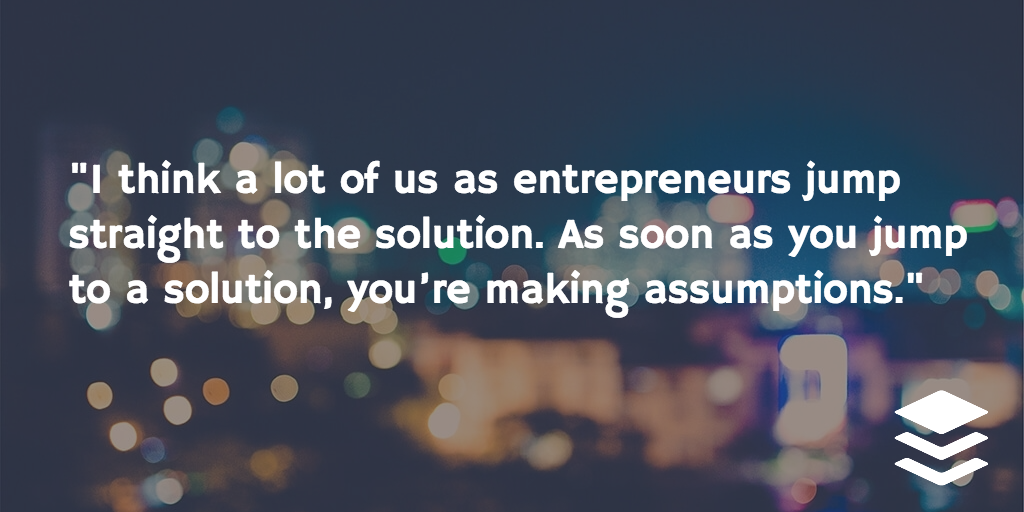
That’s why my focus would be on customer development, on asking as much about the problem as I can without getting to solution. Ideally, you want to understand the user’s problems so well that the solution presents itself. This is really difficult, I’m not that great at it and that’s why within Buffer we’ve made it a key focus and have several people in the team full-time working on doing customer development.
If that sounds interesting to anyone, we’re looking for more people to be part of the team to do that.
8. 10 years from now
Q: Where do you see yourself in 10 years? – Ignacio
A: 10 years, wow. I’ll be 38. To begin with, I expect to still be working on Buffer—I’ll be surprised if I’m not. In that time, I would guess we could easily be 1,000 people. It’s crazy to think about.
On other topics, I expect to have a family, too—relationships are something I’ve not put too much focus on in the last few years while Buffer was in a fragile early stage, however now I am feeling more ability to focus a little on some personal things.
9. How Buffer hires
Q: How many people have been head-hunted by Buffer, compared to those who have applied through a job listing? – Chris
A: We’ve had such a strong focus on culture-fit, and we’ve also been lucky to have created a strong brand around both the product and our company values and culture. As a result, we receive 1,500-2,000 applications per month. Many, many people apply to be part of the team and know a massive amount about us before we start talking with them.
We’ve been lucky to find a way to make fully inbound hiring work super well for us, and we’ve actually struggled a lot with outbound hiring. I think there might only be 1 or 2 people in the team we’ve hired that way, if even that.
I think this might need to change as we progress further, especially if we need to find people with a lot more experience to join the team and be leaders of areas. We’re thinking a lot about that challenge, whether to focus on fully on nurturing people or whether to try to hire more senior people. I think right now we’re leaning towards building a culture of learning and nurturing leaders.
10. Culture vs. product
Q: Buffer has become widely known for its culture, transparency, and overall progressive nature. In fact I would say that the company is more widely known for this as opposed to the product itself. I’m sure this has benefits (such as finding amazing employees), but wonder if it gives you any challenges as well… – Chris
A: I think it can create some challenges also. One is that I think sometimes we end up focusing on the “non-product” side of things too much, when we really need to make sure that is balanced.
Another challenge that comes to mind is that we have created a higher bar for ourselves in terms of how much we share about everything, and that can in some ways slow us down.
A final challenge is that when we share so much, if we then change our minds, we end up with a lot of content out there that might be out of date or worse, might completely contradict our current views.
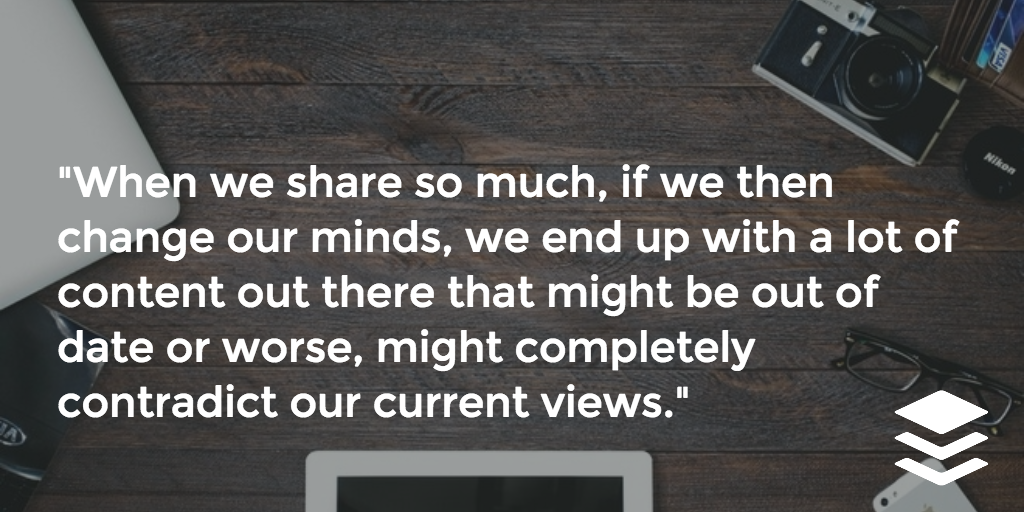
11. Balancing positivity and feedback
Q: What’s been the biggest challenge balancing a positive culture and necessary critical feedback? – Andrew
A: I think that itself has been the biggest challenge: to balance the positivity value with being truly honest and giving appropriate feedback.
I think for me it comes down to the difference between complaining and being honest with necessary feedback. There’s a quote from Eckharte Tolle’s A New Earth that helped me to find the line between these things:
“Complaining is not to be confused with informing someone of a mistake or deficiency so that it can be put right, and to refrain from complaining doesn’t necessarily mean putting up with bad quality or behavior. There’s no ego in telling the waiter that your soup is cold and needs to be heated up, if you stick to the facts, which are always neutral. “How dare you serve me cold soup!” – that’s complaining. There’s a “me” here that loves to feel personally offended by the cold soup and is going to make the most of it. A “me” that enjoys making someone wrong. The complaining we are talking about is in the service of the ego, not of change.”
This what I try to aim for—it’s really hard!
12. Something you used to believe
Q: What’s something you used to fervently believe that you now see as fundamentally misguided? – Erik
A: There are so many things. About 9 months ago when we were right in the middle of our focus on being self-managed, I truly believed that leadership, management and coaching were not required in organizations. I’ve learned how very wrong I am.
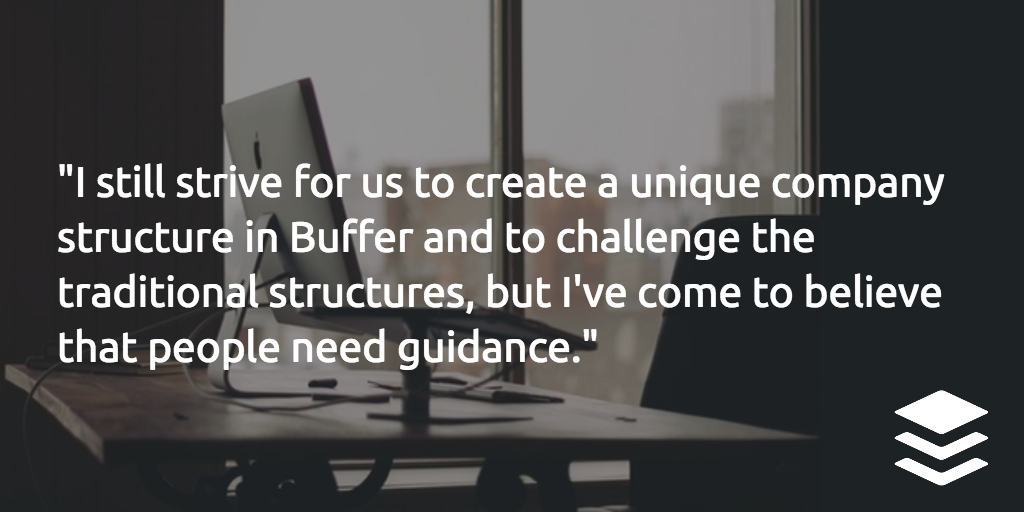
I still strive for us to create a unique company structure in Buffer and to challenge the traditional structures, but I’ve come to believe that people need guidance based on their experience level and stage within the company, and we lost a lot when we didn’t have that focus.
13. Buffer’s focus for 2016
Q: Noticed that you’re looking at OKRs as something as you round out 2016. What will be some of the aspects you’re looking to focus on for the new year to further drive the transparency, culture and product at Buffer? – Andy
A: We’re still figuring out OKRs and accountability, I’m excited about the steps we’re making there.
I think in terms of transparency, two areas come to mind that we could improve a lot: our product roadmap, and our hiring process. Those are key areas that I think we’re less transparent than we’d like to be.
In terms of culture, we’ve noticed that as we’ve doubled in size in less than half a year, some of the focuses we’ve had have become harder to keep up. One example would be our focus on self-improvement, which has slipped away slightly as a core thing.
In terms of product: a big one will be to launch Respond, of course. Alongside that, we want to keep innovating with our microbusiness/individual Buffer product (free and awesome plan) as well as really building out a solid solution for the medium/large business segment with Buffer for Business.
You can check out every question and answer right here.
Do you have a question for Joel? Share it with us in the comment and we’ll make sure he answers it in a future post!
Try Buffer for free
140,000+ small businesses like yours use Buffer to build their brand on social media every month
Get started nowRelated Articles

In this article, the Buffer Content team shares exactly how and where we use AI in our work.
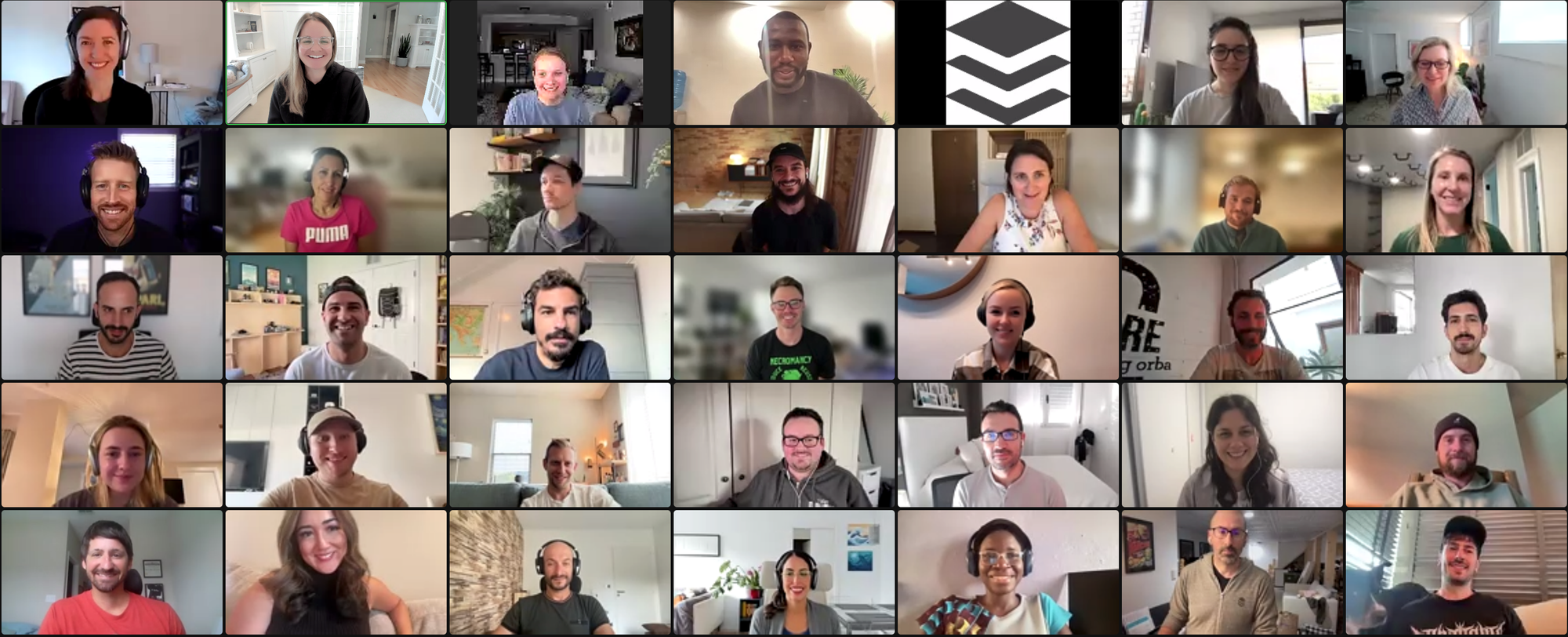
With so many years of being remote, we’ve experimented with communication a lot. One conversation that often comes up for remote companies is asynchronous (async) communication. Async just means that a discussion happens when it is convenient for participants. For example, if I record a Loom video for a teammate in another time zone, they can watch it when they’re online — this is async communication at its best. Some remote companies are async first. A few are even fully async with no live ca

Like many others, I read and reply to hundreds of emails every week and I have for years. And as with anything — some emails are so much better than others. Some emails truly stand out because the person took time to research, or they shared their request quickly. There are a lot of things that can take an email from good to great, and in this post, we’re going to get into them. What’s in this post: * The best tools for email * What to say instead of “Let me know if you have any questions” a